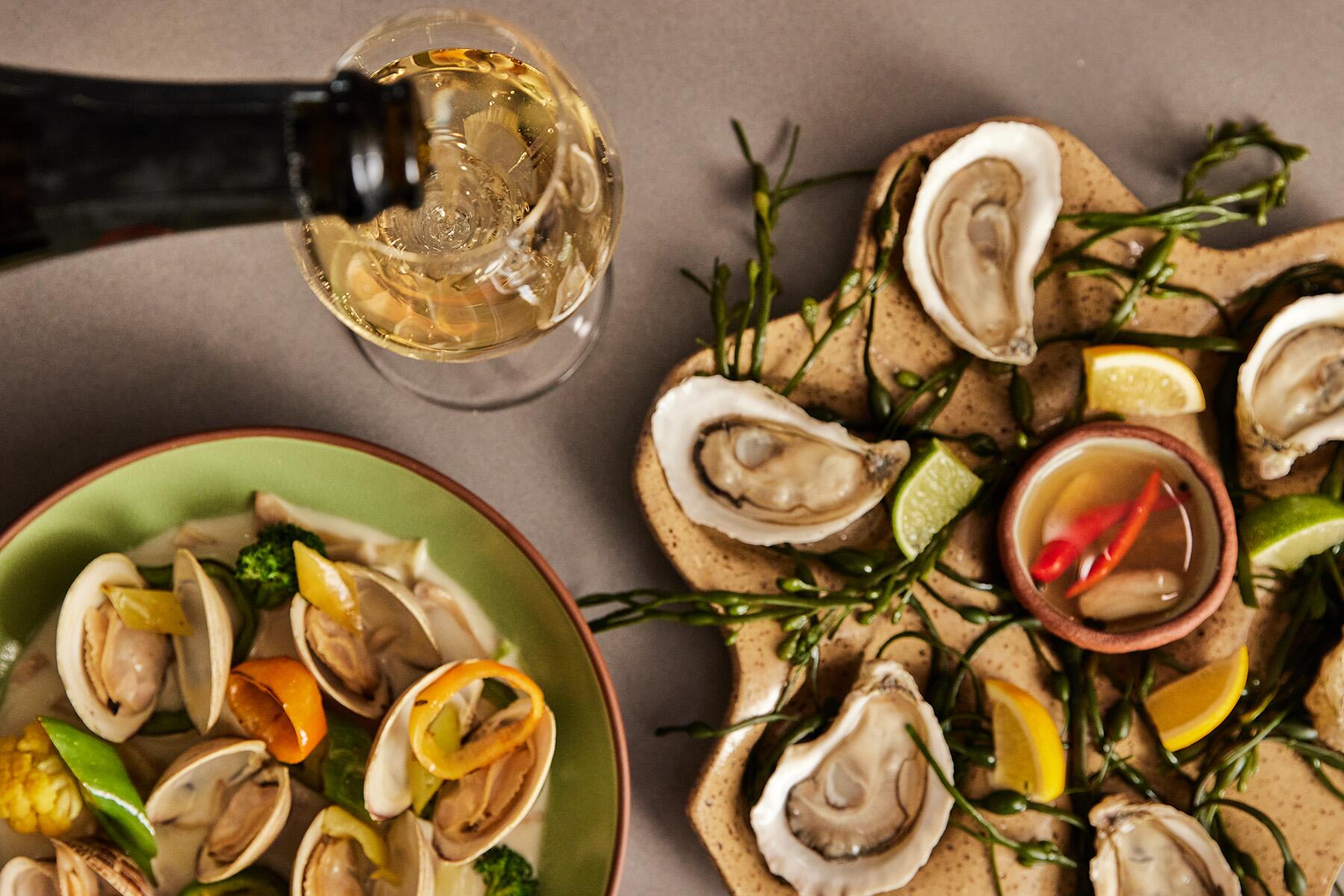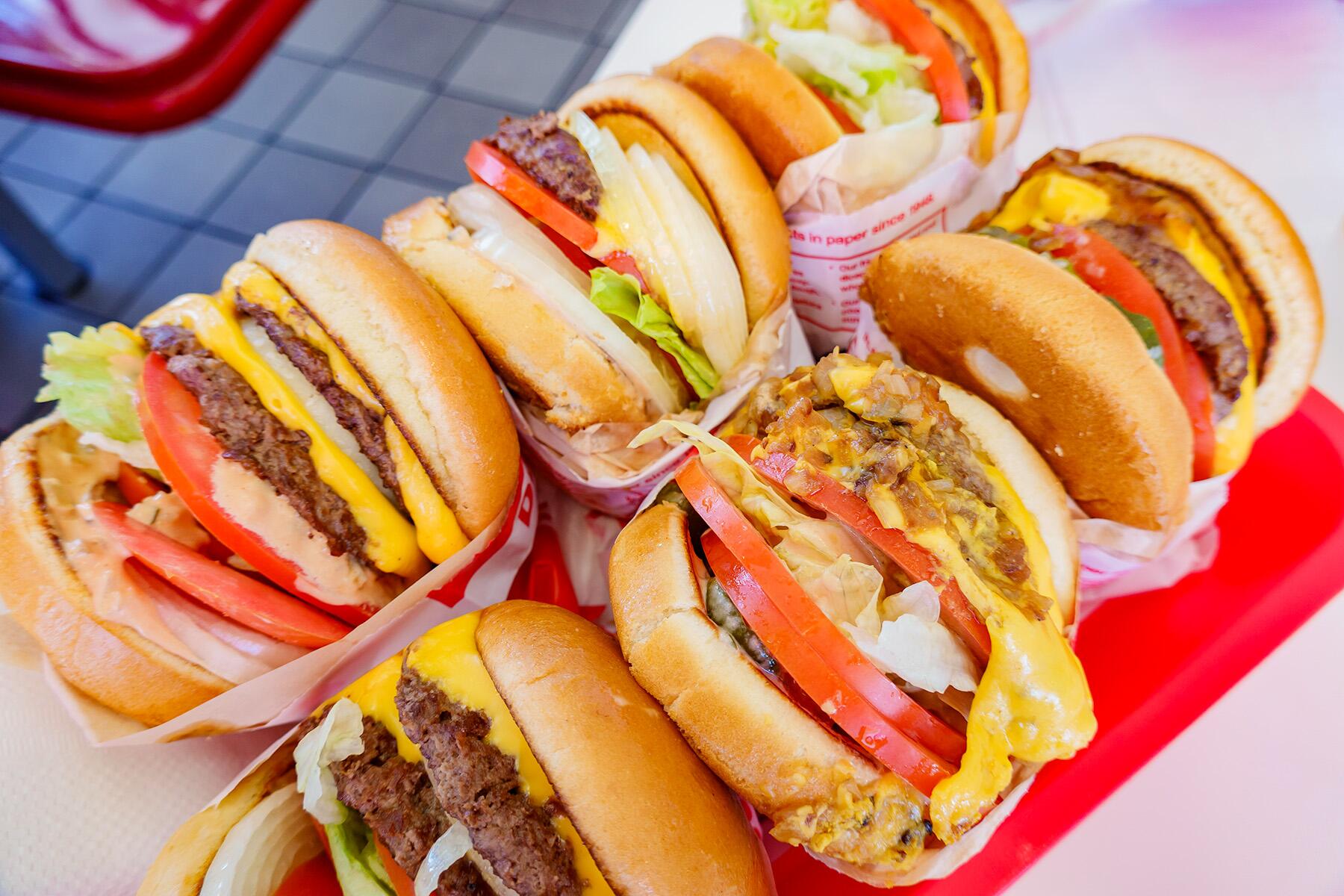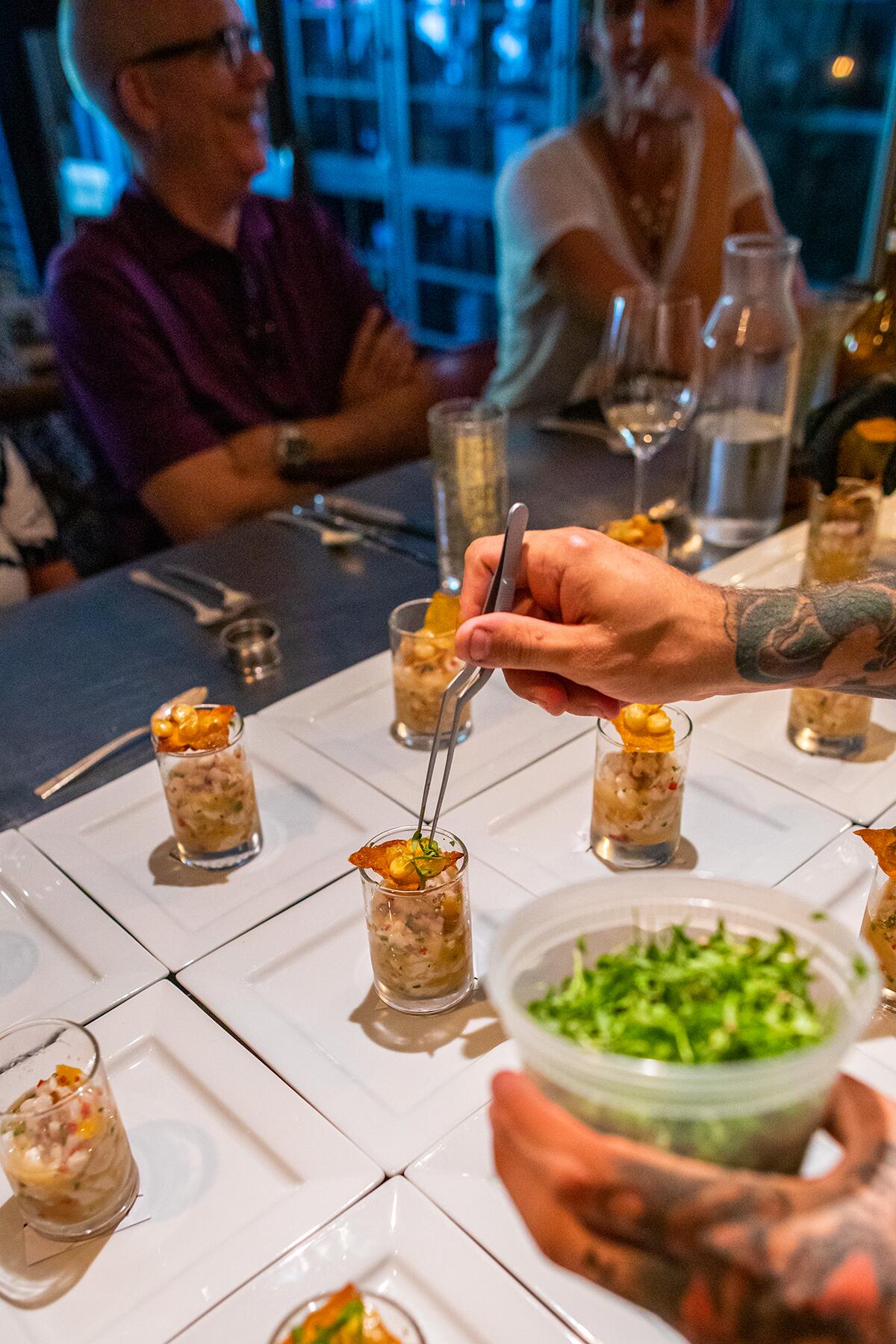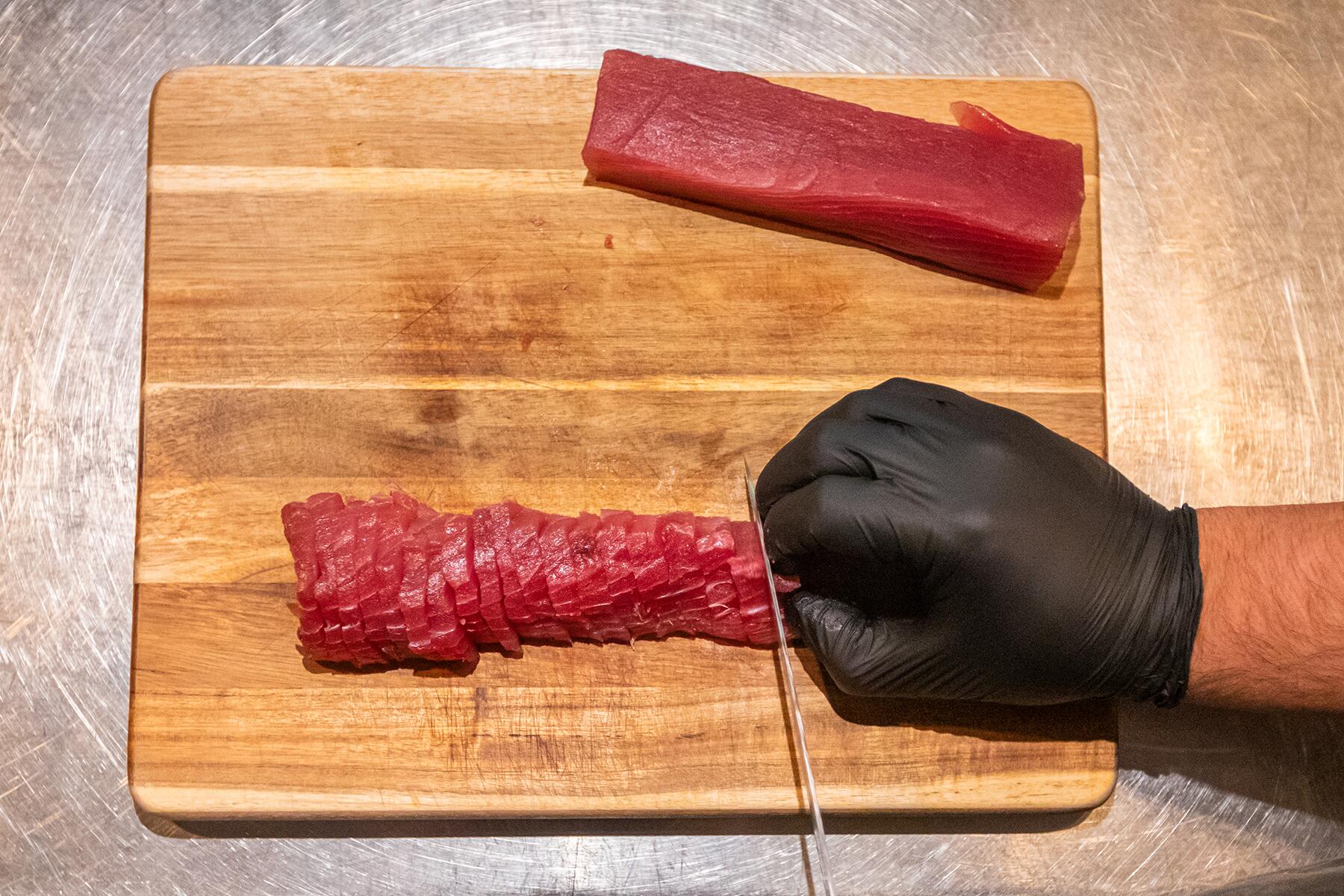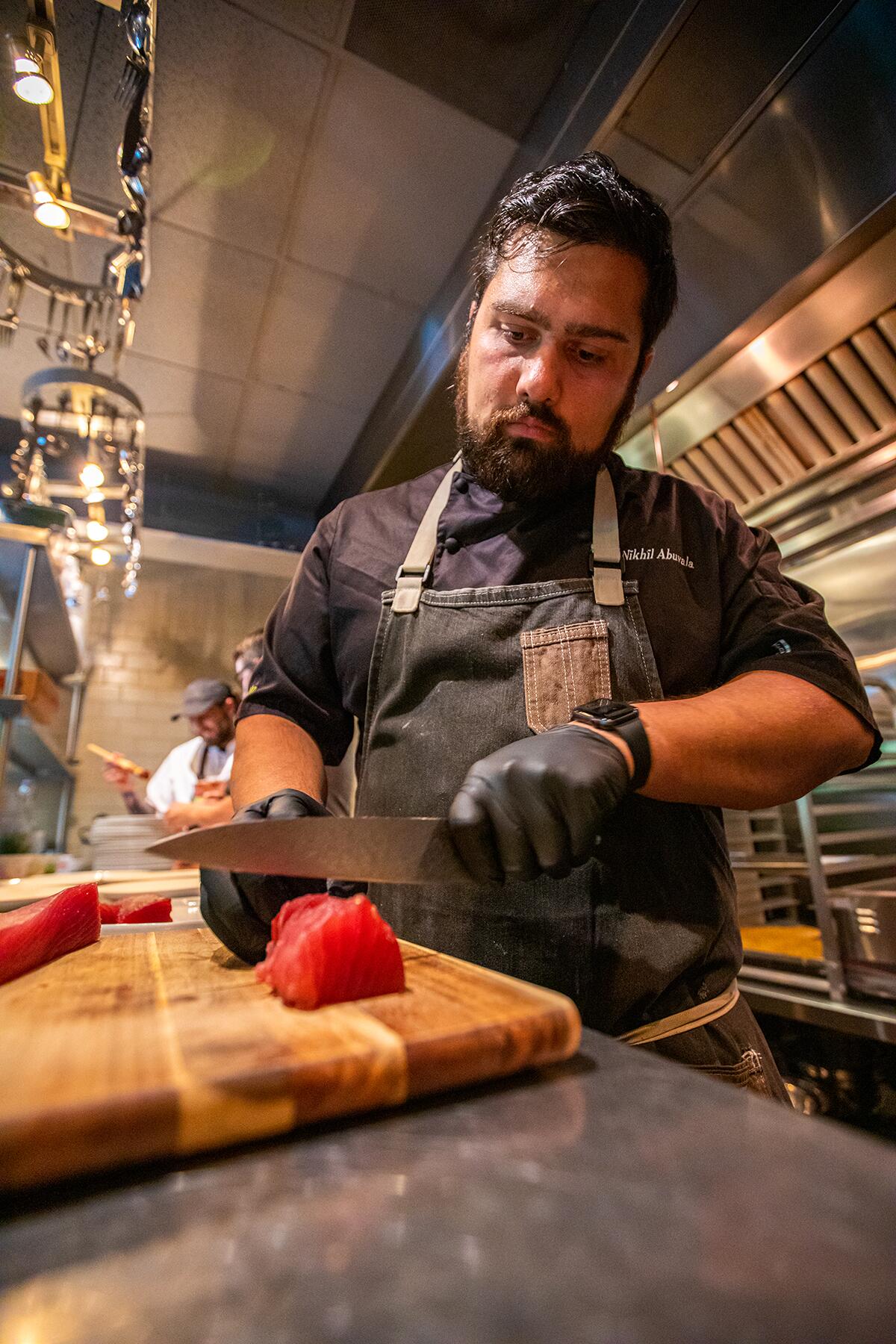The pandemic's effect on one Florida-based restauranteur.
In Grayton Beach, Florida, Chef Nikhil Abuvala is making Asian cuisine accessible to coastal residents. He owns two restaurants: Roux 30A, a small supper club offering rotating tasting dinners in an intimate 900-square foot setting, and Nanbu, the Panhandle’s only noodle bar. Everything is locally sourced and prepared with Abuvala’s deft craftsmanship.
Abuvala started his journey at his grandmother’s hip. “[She] is from India, and still lives there. She came over and helped out raising me—that woman, not so much now because she is 95, and can’t cook as much for herself—but back then, literally, she woke up in the morning, and she cooked and she prayed. I spent a lot of time cooking with her…food has always been an important part of my family. No matter what anybody was doing, at the end of the day, we were all there to have dinner together,” Abuvala said.

By 17 years old, Abuvala was out of high school, deep into the South Florida restaurant scene, and traveling in the off-season to work at international eateries. It was one of these three-month stints that stuck with him. “I walked up to Central, [who had already turned him down] knocked on the back door, asked if I could do dishes. Two weeks in, one of the cooks injured themself. It was a really important night, and they were freaking out. I said, ‘Hey, I can help. I can do this,’ and that’s what got me on the line.”
Recommended Fodor’s Video
“The experience at Roux is this really intimate exchange between the chef and the diner where it’s all open, and it’s all done in a very transparent, genuine way that people really love. And by switching to this tasting menu only, it’s enhanced that quality tenfold.”
Central’s mission of “creating links between humans, nature, and culture, and striving to highlight those elusive elements that few people see in their daily lives” is evident on Roux 30A’s plates. Abuvala has visited 27 countries, and Roux’s international menu reflects that passion for experiencing other cultures. Abuvala designed an “Around the World” tasting menu series. “Before COVID we did 6,065 dinners with 38 different countries.” All that changed when stay-at-home orders came down. “This is a very small restaurant. We seat 44 people. When lockdown was relaxed, we were only allowed to have 25% capacity—for us, that’s 12 people. So we created the 12 dinner series. It was a six-course tasting menu. It booked out immediately and stayed that way for four months. Then we were allowed to open up to 50% capacity. So it’s 24 rather than 12, but we kept the series, but with 12 different menus that change every two weeks.” And, according to Abuvala, that model is here to stay.
One of his key takeaways from the pandemic thus far is the tasting menu was the right direction for Roux 30A. “The experience at Roux is this really intimate exchange between the chef and the diner where it’s all open, and it’s all done in a very transparent, genuine way that people really love. And by switching to this tasting menu only, it’s enhanced that quality tenfold.”
One of the most interesting pivots Abuvala made was his almost farm share approach to the menu. He took a chance and started allowing what was fresh and available to dictate his choices, “I would tell my rep at JB Foods, which is basically a farm collective, ‘This is roughly what we need quantity-wise.’ We get deliveries on Tuesdays, we get deliveries on Fridays. It shows up at our door, we don’t really know what it is until it gets here, and then we make a menu based on whatever they send us.” Wildly unpredictable, but also lots of room for creativity. “You don’t have to work as hard with your food if the quality of your product is already there. The most inspiring thing for me is not trying to think about ‘what can I do?’ It’s spreading everything out on the table and saying, ‘Wow, look at what we got…This is what I should do with it.’”
This spirit of ingenuity was the seed for Abuvala’s other restaurant. Nanbu, the spot to get noods, combines his Indian roots with his love of Japanese cuisine in a walk-in only, cozy, open-kitchen concept whose name translates to “Southern” in Japanese. And, it exists thanks to a signature dish on the menu, the steamed buns. “The reason Nanbu is open is because of those buns. Almost eight years ago, I was finding any way to earn extra cash because Roux was self-funded so I sold at farmer’s markets on the weekends…They constantly sold out, and I thought eventually I’ll open a restaurant for these steamed buns,” Abuvala said.
The buns may have been the spark, but the other reason Nanbu exists is Abuvala’s own yearning for a noodle shop he could go to after a long shift at Roux 30A. He calls it “selfish,” but it was also revolutionary. With very few options in the way of Asian fare, other than buffets, a ramen bar stands out. Abuvala knew he was embarking on something different that would need some education. “I have to teach people what ramen is down here. The easiest way was to incorporate [indigenous] ingredients to make it more familiar.” And, that is what is on the menu—ramen with collard greens, corn, loads of fresh local ingredients from farms you can find just up the road.

Fortunately for Abuvala, Nanbu was already set up to be a to-go-friendly restaurant. With limited seating, and tiny kitchen space, he opened it knowing he would need to have robust takeout options to be successful, and that approach aided him during the pandemic. When restaurants shuttered, Nanbu became one of the only eateries offering regular takeout and delivery. “This area is a very small vacation destination. Most of the restaurants didn’t have a to-go program set up, let alone delivery service. Why would you? We’re so busy all the time. But, Nanbu started with[those options] because of our size and lack of outside refrigeration,” Abuvala said. This made the mandatory closure and graduated reopening easier for Nanbu than Roux 30A. But, issues affecting restaurants around the country did not skip businesses in the panhandle.
As restaurants start to reopen, there has been a national outcry over staffing shortages. Some blame unemployment compensation, some blame systemic racism, some blame inequity in wages, or lack of opportunity. On Scenic Highway 30A the staffing shortage is amplified by the already problematic situation created by Hurricane Michael that ravaged Florida’s panhandle in 2018. According to Abuvala, “We got hit hard. Our staff [consists of] people driving from Fort Walton, from Crestview, from downtown Panama City. When Michael came, a lot of those people moved away because the hurricane destroyed their home, or their cars, or trees blocked their neighborhoods. They couldn’t afford to move to 30A, or even close because there is no affordable housing.” Restaurants in this area were still trying to recover from staffing shortages from the hurricane when the pandemic hit.
In addition to the challenges of maintaining staff when nothing is open were issues with contract workers. The panhandle relies heavily on students coming from other countries on contract student-work visas. The closing of borders and halting of international travel completely cut off that labor resource. Overnight restaurants lost these workers with no hope to recover them for an indefinite period. The compounded problems of a heavily international workforce combined with staff losses from Hurricane Michael, and mitigating factors, like long commute times and reduced earning potential keeping staff from returning to work, created the perfect storm for the hospitality industry on 30A.
“They’re talking about going to $15 an hour but, $15 an hour is already our lowest paid staff member…We’re looking into what other solutions we can offer to make working in a restaurant not be this dead-end, crappy job. A lot of my focus is on creating different environmental solutions for employees.”
Talk of raising the minimum wage and eliminating tipping occupy a lot of the national conversation surrounding staffing shortages. But Abuvala is already there. “They’re talking about going to $15 an hour but, $15 an hour is already our lowest paid staff member. That’s what our dishwasher makes.” And he has not stopped at offering a higher wage because he recognizes he won’t be able to attract and keep employees without thinking more about the culture of his businesses, “We’re looking into what other solutions we can offer to make working in a restaurant not be this dead-end, crappy job. A lot of my focus is on creating different environmental solutions for employees.”
Health insurance, paid time off, and personalized performance reviews where Abuvala turns the tables and asks staff to give him feedback on how the restaurant can be a better place to work are ways in which he is moving towards a stable staff that will stick with him. He also has an interesting take on tipping, “I would like to eliminate tipping entirely. I’d rather work on creating more of a service fee that is shared across the board. We’re moving towards that slowly, making sure everyone’s paid at the same level, [front and back].” And this is all with only 20 employees between both locations—a big feat for an operation so small. His goal is to defy the national restaurant turnover averages and create a healthy environment that offers a good work-life balance.

Even with the challenges from Hurricane Michael, infrastructure issues, and the pandemic, Abuvala recognizes he can still count himself lucky. “I have so many friends that lost their jobs, or their restaurant had to be closed, some of them permanently. My sympathy goes out to them. As we roll out this vaccine, it’s still going to be very difficult for them to recover. Those of us that are here were lucky, but a lot of people in other places weren’t…our industry is hard enough as it is. Take care of the employees that are there, and if you can afford it, tip the back of the house, because maybe they just got back to work, and have been living on just unemployment—not because they’d make more from unemployment, but because they didn’t have a choice…and, it’s not just because this person can’t work hard enough, it’s because their environment isn’t one that [offers] better chances and opportunities.”
Beyond the pandemic, Abuvala has big plans. There is talk of another Nanbu in a different market, perhaps a fine dining restaurant on a different part of 30A, and some global initiatives. Nanbu and Roux 30A saw pivots like fundraisers, increased to-go business, and streamlining of menus, but there were no meal kits or virtual offerings. “Part of our strategy moving forward is [producing] content for both restaurants, whether it be cooking classes, or check-ins, or ways people can enjoy us at a virtual level. This is an interesting new market that developed because of COVID-19. We’re a vacation destination for southern cities, and Chicago, as well as a lot of places in the Midwest, are starting to become feeder markets. Still, the majority of our customers are people that drive here. Being in Grayton Beach, Florida, and having this person from the U.K., or Japan checking in and asking questions like, ‘How did you chop that onion?’ It’s a really cool idea.” But for now, with record-breaking March numbers, Abuvala is just trying to keep up with the crowds that have descended on Florida.

